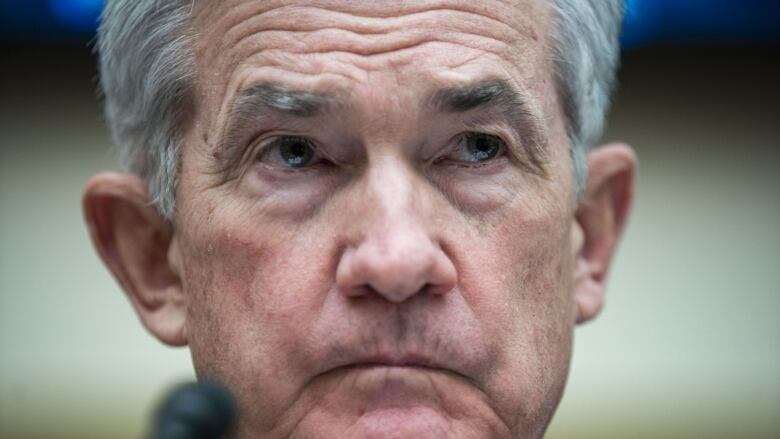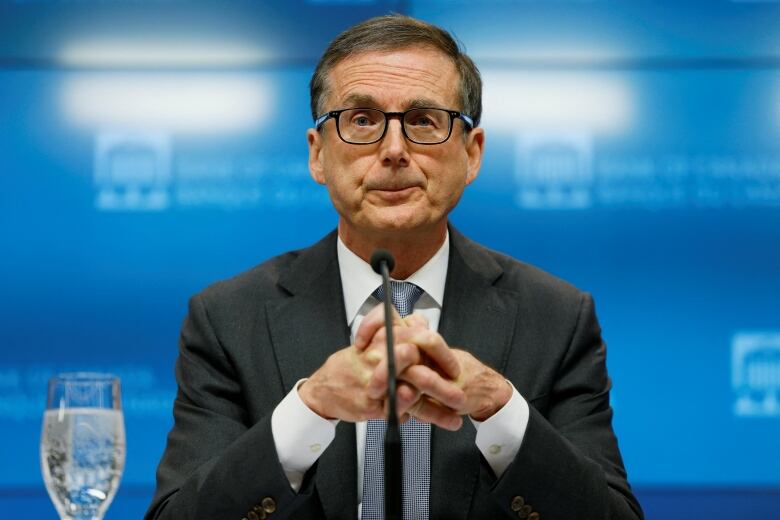Higher interest rates are coming. Omicron is unlikely to change that
Canadian borrowers prepare as U.S. central bank warns of 3 rate increases in 2022

As Canada's federal government preparesfor another encounter with COVID-19, Canadian borrowers must face a second hazard:the prospect of a sharp rise in interest rates in2022.
While the world's most powerful central banker, Jerome Powell, warned on Wednesday that a new variant capable ofsmashing through vaccine defences could check the U.S. Federal Reserve'splans to cut stimulus, so farit appears Omicron is not that variant.
As yet, the Fed's interest rateremainsunchanged at below one quarter of a per cent.
Major crackdown on inflation
But in what's being described as a major about-faceto crack down on inflation, Powell announced the central bank will double the pace at which it slows its bond buying, leaving the Fed open to begin raising interest rates as soon as April.
And estimates by Fed officials who make monetary policy decisions are that the bank will raise interest rates three times in 2022, leaving room for other central banks, including the Bank ofCanada, to do the same.
Asked whether the Omicron versionof the COVID-19 virus now sweeping through the world could block the central bank's plans to roll back stimulus, Powell said that so far, his judgment was that the U.S. economy's vitality would not be diminished by the new variant.

"The early assessment is highly transmissible, perhaps not as severe," he said. "It may well come to the United States and replace Delta as the dominant variant fairly quickly."
But after experience with the Delta variant, the Fed chair seemed confident theeconomic effect on the U.S. would be small.
"I do think wave upon wave, people are learning to live with this," he said.
And Powell saidpowerful job creation, a vibranteconomy and soaring inflation meanthe U.S. central bank has little choice but to end stimulus and crack down on inflation.
Fed plays catch-up with Canada
The Federal Reserve is only now catching up with Canada. At a newsconference of his own earlier in the day, Bank of Canada governor Tiff Macklem, after saying he was uncomfortable with inflation at these levels, was asked why he didn't take action.
"We are taking action," Macklemreplied briskly. "We tapered and we ended Q.E."
Quantitative easing, or Q.E.,is another term for the stimulative bond-buying that the Fed is only now promising to end by spring. Despite a determination by the Canadian central bank to act independently fromits larger counterpart in Washington, it can be difficult for the Bank of Canada to raise interest rates muchbefore the Fed does.

When Canadian rates rise faster than those of the U.S., the move of hot money into the loonie pushes the Canadian dollar up, making Canadian exports more expensive around the world. A decision by the Fed to raiseinterest rates will free up Macklem to act as well without the worry of damaging Canadian export trade.
Inevitably rate increases by the Federal Reserve affect Canadian borrowers. The rule of thumb is that while the Bank of Canada's rate hikes affect short-term borrowing such as lines of credit, hikes in the U.S. rates have a bigger impact on longer-term loans such as mortgages.
In some ways, the impact of rising rates could hit the Canadian economy harder. Inflation here was unchanged at 4.7 per centon Wednesdayand really doesn't need asmuch discipline as in the U.S.,where prices are rising at a rate of 6.8 per cent. And if rate hikes cause a drop in Canadian house prices, which on Wednesday hit another all-time high, that could have an impact on the wider Canadian economy.
As both central bankers said on Wednesday, the main cause of the current bout of inflation is a burst of spending on goods by consumers just as the supply wasslowed by COVID-19 lockdownsat production facilities. That was followedby shipping bottlenecks as supply chains have struggledto catch up, perpetuating shortages and helping to drive prices up.
Rate hikes don't fix bottlenecks
One complication for both central bankers is that higher interest rates don't really solve that problem. In fact, the arrival of Omicron could actually worsen supply problems as people once again divert spending on trips and restaurant meals towardordering more physical goods online.
But as high inflation persists, Powell and Macklemfeel they need to cool things down before people just assume inflation will continue what they call embedded inflationary expectations.
As Macklem said on Wednesday,"The challenge here is to bring inflation back to target without choking off the recovery."
At the Federal Reserve news conference, reporters demanded to know whyPowell hadn't acted more quickly and whether the fact that he had been waiting for his reappointment as Fed chair meant he had delayed cutting stimulus even though inflation had clearly started to rise.
Powell denied that had been a factor, citing the sudden autumn shift in unemployment and economic growth that completely changed his outlook.
"We're coming out of what we certainly hope will be a once-in-a-lifetime, certainly historic ... first really global modern pandemic, which looked at the beginning like it might cause a global depression, so we threw a lot of support at it," Powell said, explaining how much things have changed.
"What's coming out now is really strong growth, really strong demand, high income," he said. "People will judge in 25 years whether we overdid it or not."
Follow Don on Twitter@don_pittis













_(720p).jpg)


 OFFICIAL HD MUSIC VIDEO.jpg)
.jpg)



























































































